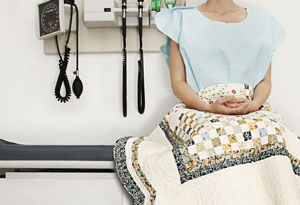Should You Get an Operation Outside of the Hospital?

Photo: Olivia Barr
Increasingly, patients are choosing the operating table in their doctor's office over the one at the hospital. Here's how to determine whether the office is the right setting for your next surgery.
Last spring, nearly a year after the birth of her second child, Robin Lively, 38, of Wesley Chapel, Florida, decided that her family was complete. When she asked her gynecologist, Martina Reiss, MD, about surgical sterilization options, Reiss said she could have the procedure done at the local women's hospital—or right in Reiss's office. Lively jumped at option B. "I'd been hospitalized before—for treatments for Crohn's disease, two C-sections, an appendectomy—so I knew the time and aggravation involved," she says.Her hopes for a quick and easy experience were fulfilled: Within a half hour of arriving at Reiss's practice, Lively was on the operating table, sedated by a board-certified anesthesiologist. She awoke in a cozy recovery room and was home before lunchtime. "At a hospital, everything before and after an operation is a hassle," she says. "The office was so much faster and less stressful because everyone's focus was entirely on me."
Lively's experience is becoming increasingly common, as surgeries that were once performed solely in the hospital operating room migrate to physicians' offices. "The type and range of office-based surgeries—known as OBS—have exploded in recent years," says Lawrence S. Reed, MD, president of the American Association for Accreditation of Ambulatory Surgery Facilities, one of several groups that offer surgery certification for physicians' offices. According to the American Hospital Association, 16 percent of outpatient surgeries were performed in an office in 2005 (the most recent year for which statistics are available), compared with fewer than 10 percent in the early 1990s.
That number is only expected to rise. "By 2015 the majority of operations will be done outside hospitals—in both doctors' offices and freestanding surgery centers," predicts Michael Kulczycki, executive director of ambulatory care accreditation at the Joint Commission, an independent group that certifies hospitals and, increasingly, offices nationwide. But before you agree to forgo the OR, it's important to consider the risks as well as the benefits.
The Office Advantage
Experts point to several reasons for the upswing in OBS. Across the country, the financial downturn has led to a flurry of hospital closings, which means that many communities have fewer available operating rooms. "It has become tough for physicians performing nonemergency procedures to book OR time," says Reed.
Today's anesthetics are also faster and safer than they were in the past. The most popular wear off just a few minutes after surgery (compared with an hour or more for older drugs) and are less likely to trigger side effects like severe nausea, says Hector Vila Jr., MD, former chair of the committee on ambulatory surgical care at the American Society of Anesthesiologists.
Significant breakthroughs in the procedures themselves have also made OBS more popular. Sterilization, for example, no longer requires an incision to tie off or sever the fallopian tubes; instead, flexible metal coils are inserted to block the eggs' path. For endometrial ablation (a hysterectomy alternative used to control excessive menstrual bleeding), doctors can instantly vaporize the uterine lining using a heated balloon, rather than a more painful and time-consuming electrical current. Minimally invasive procedures using a laparoscope—a tiny video camera that allows the doctor to see what's happening as she works inside your body—are also transforming many operations.
And there are some compelling benefits to having surgery in an office:
1. You save money: OBS can be quite a bargain because the ancillary costs (such as use of the operating room) are about 70 percent lower, according to Reed. This is especially important if you're having a procedure that insurance doesn't cover, or if your plan carries a high deductible.
Two more benefits...plus a few drawbacks
As a reminder, always consult your doctor for medical advice and treatment before starting any program.



